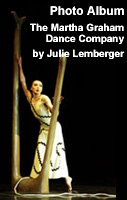





Go
back to Flash Reviews Flash Review 2, 5-25: A Sleepwalker
to Wake You Up By Alicia Mosier What a night! From the light, sweet notes of Peter Boal in "La Source" to the fireworks finale of "Theme and Variations" (the fourth movement of "Tschaikovsky Suite No. 3"), New York City Ballet delivered a performance full of breathless highs last night. If you thought a State Theater audience couldn't be roused except by somebody falling down onstage, think again. It was Balanchine's "La Sonnambula" that did it -- that mad, shocking, shivers-down-the-spine ballet about a coquette and a sleepwalker and the poet who burns to possess them. After the third (third!) curtain call for Wendy Whelan as the Sleepwalker and Nikolaj Hubbe as the Poet, a man behind me exclaimed, "A pretty good way to stay competitive with the guys across the plaza!" Amen to that, and another cheer for City Ballet, which last night pulled out all the stops for the house of Balanchine. "La Sonnambula" premiered on the Ballet Russe de Monte Carlo in 1946, and even in the melodrama-charged atmosphere of that company it must have been a killer. It begins, as so many of Balanchine's "party" ballets do, with a more or less straightforward ballroom scene. But Vittorio Rieti's score, with strange dissonances edging into its Bellini-inspired sweep, sends a shiver through the house that soon makes its way into the dance. There's much more to this party than the pretty girls and boys in masks and heels at first let on. In the midst of their fitful, steppy dancing, Jenifer Ringer, the Coquette, rushes in on the arm of Jock Soto, the Baron. In her dress of glinting red and black, she's the fascinating center of the room. Ringer, making her debut in this role, was alluring and deadly, with a lifetime of love and scorn (and, most probably, being scorned a time or twelve) showing in her eyes at every moment. An astonishing actress, she. The Coquette mingles with the crowd until, suddenly, the Poet, in white, appears at the back of the room. He stands there for a long time, waiting to command the attention of the others, and especially of her. (As a fellow critic remarked last night, Hubbe, with his great Danish training, knows what to do when you don't do anything.) It takes some doing by the Baron to get his lady to come to greet the Poet; there are so many flickers of feeling between Hubbe and Ringer that they can hardly move through the fire to get closer together. When they do, his kiss on her hand is both irrelevant and a flashpoint. For the rest of the ball, both within and outside their enthralled pas de deux, they don't stop looking at each other. They dance out a passion that could end, like everything else in this ballet, in myriad ways. Balanchine brings this relationship to a near-fever pitch and then releases it. In come two couples (enacted by Elena Diner, Kristin Sloan, Antonio Carmena, and Craig Hall, all in debuts) for a lovely Pastorale, followed by Alexander Ritter and a sharp, self-assured Jennifer Tinsley in a wicked, stylized pas de deux, followed by Tom Gold as the craziest Harlequin you've ever seen, complete with a double tour into the splits and a bad back. Everybody dances some more -- I can't quite put my finger on the peculiar half-light, half-dreadful mood of the dancing at this party -- and then one by one the ladies take off their masks and everyone leaves the room. Except the Poet. This ballet is a series of eerie jolts. The entrance of the Sleepwalker -- through an arch, carrying a candle whose light we've already seen passing behind the windows above -- is of a piece with all of them. There's so little to the whole ballet, really, that you think you must be dreaming the way you feel: giddy, on edge, full of anxious laughter, your teeth full of metal. The Poet is one of the most complete male characters Balanchine ever created, and in his subtle, quiet, extraordinary performance Hubbe revealed its every dimension. In his response to the Sleepwalker he is clearly the same man who responded to the Coquette, a man both curious (that is, willing to give himself up to something fascinating) and commanding (wanting to make it his). Only here, because the woman is so very different, we see other dimensions of his personality. Whereas, with Ringer, Hubbe let a woman challenge and demand things of him -- let her set him ablaze -- with Whelan as the silent, dreaming Sleepwalker he becomes completely dominating. As she floats through space in quicksilver bourrees, he spins her and pushes her and stretches out his leg in front of her to see what it will do to her. She goes where he sends her. But as is the way with Balanchine women, she's both passive and purposeful. Whelan controls Hubbe's movement as much as he controls hers, and even as he fences her in with his arms, we see his passion in its constrained, almost pathetic, entirety. The ending of "La Sonnambula" is among the most shocking and perfectly conceived in all of Balanchine's work. The Coquette (who's been watching this odd pas de deux for a while from stage right) frantically whispers something goading to the Baron. Obliging host that he is, the Baron stabs the Poet with a knife. When the Sleepwalker suddenly appears again, now in the midst of the anguished revelers, we know something very strange is about to happen. But can anyone ever be prepared for the sight of the Sleepwalker, who had seemed to be as light as the moon, bearing the Poet's body in her arms back through her archway? She simply takes him. We know not where, or for what. All the shudders that have come before are as nothing compared to the awful, fascinating shock of this reversal, of the disappearance of this man into this woman's upper chamber. It leaves you feeling like you do when a candle's been blown out: your mind full of the fire that was just there, your heart full of terrified excitement. The audience that had responded warmly to Margaret Tracey, Abi Stafford, and Peter Boal in Balanchine's "La Source" (a ballet which Boal is now holding together almost singlehandedly) thus sat bolt upright and roared for "La Sonnambula." After that, they were hungry for more -- and so, apparently, was the cast of "Tschaikovsky Suite No. 3," most of which had probably been standing backstage listening to the ovation for Whelan and Hubbe. The "Suite" (1970) is a full-blown efflorescence of Tschaikovskian passions -- brooding, ironic, playful, ecstatic. The first three movements ("Elegie," "Valse Melancolique," and "Scherzo") are made up of cascades of pastel skirts and bare feet and long hair, in the midst of which some men (Kipling Houston, James Fayette, and Gold) chase and lose and find their women (Helene Alexopoulos, Kathleen Tracey, and -- in another virtuoso turn -- Tinsley). The "Tema con variazioni" which follows is entirely different in mood and scope: exquisitely formal, sparkling as a diamond after all that misty whirling. (It was originally choreographed for "the guys across the plaza," American Ballet Theatre, in 1947.) Miranda Weese wore the most glittering of all the crowns. Sassy and flashing, she turned in a performance that even Charles Askegard's nervousness couldn't mar. (Askegard replaced an injured Damian Woetzel, and though he's ill-suited to this quintessentially Woetzellian role, he managed it wonderfully). Weese brought out all her sabers: she performed extra pirouettes, extra balances, extra *everything.* The huge corps seemed to be hanging on by its fingernails, zipping through Balanchine's most vigorous maneuvers to Hugo Fiorato's brisk tempi, but the excitement onstage was tremendous. And that glorious finale -- everybody facing front and leaping and dancing in the grandest of joy -- left me (as all great Balanchine ballets do) simply amazed, when such a thing exists in the world, to be alive. |
|||||||



